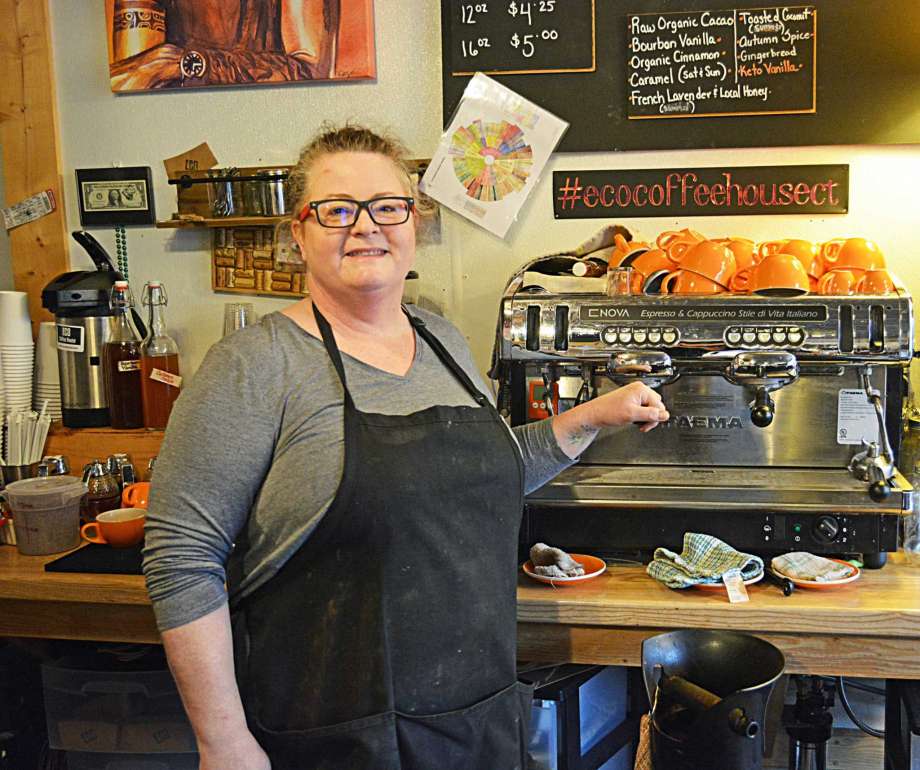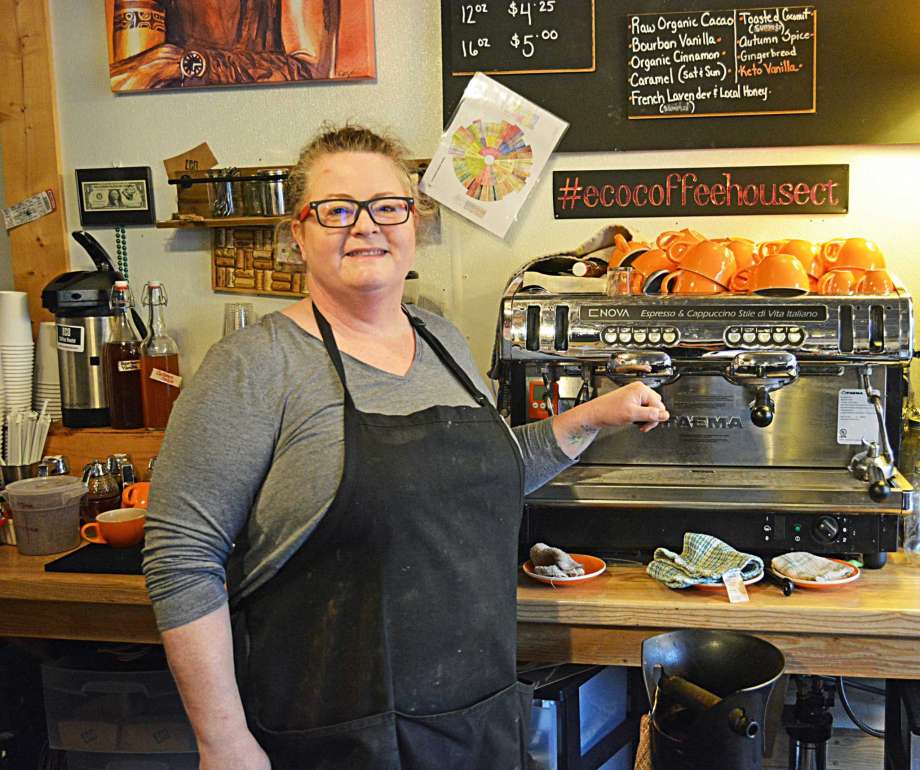-

East Hampton’s Eco Coffeehouse, owned by Susan Popielaski of Portland, is an organic espresso bar which also sells local created by people with disabilities. It’s located at 82 Main St. in the historic village center. Popielaski creates tea, coffee and other beverages infused with unique combinations, including extracts she makes herself.
East Hampton’s Eco Coffeehouse, owned by Susan Popielaski of Portland, is an organic espresso bar which also sells local created by people with disabilities. It’s located at 82 Main St. in the historic
Photo: Cassandra Day / Hearst Connecticut Media
East Hampton’s Eco Coffeehouse, owned by Susan Popielaski of Portland, is an organic espresso bar which also sells local created by people with disabilities. It’s located at 82 Main St. in the historic village center. Popielaski creates tea, coffee and other beverages infused with unique combinations, including extracts she makes herself.
East Hampton’s Eco Coffeehouse, owned by Susan Popielaski of Portland, is an organic espresso bar which also sells local created by people with disabilities. It’s located at 82 Main St. in the historic
Photo: Cassandra Day / Hearst Connecticut Media
EAST HAMPTON — In the heart of the historic village center sits a tiny coffeehouse whose owner is quietly changing the way people think about the environment, sustainability and artistic abilities of those with disabilities.
Eco Coffeehouse, owned by Susan Popielaski of Portland, is an organic espresso bar committed to selling Connecticut-made products, as well as crafts, jewelry, artwork, accessories and more created by people with “physical or invisible disabilities” at 82 Main St.
She launched the business in late October 2016 after spending two years slowly and wisely purchasing items she had budgeted for — down to the last penny.
Her Instagram and Facebook accounts are filled with enticing photographs of her coffee creations. Customers will come in with their smartphones, displaying a drink such as a latte with single-origin cacao shavings from Switzerland — photographed from the top in an eye-catching orange mug and saucer.
“Smell,” Popielski said, handing a customer an espresso in a tiny glass cup. “When it hits your tongue, it’s so delicious. People who don’t like espresso will like this. It’s very complex, between the sugar and the cream and the bourbon barrel-aged orange,” she said. “I pull it right onto the sugar cube, and then I break it up a little with a demitasse spoon,” Popielaski said in a voice that makes her beverages sound like a fine bottle of wine.
“This coffee is very low acidity-wise,” she said of Shearwater Roasters in Trumbull, which she uses exclusively. “(The owner’s) coffee is so smooth — he knows how to roast the beans to perfection,” said Popielaski, who grew up in Marlborough.
This is the first foray into business ownership for Popielaski, who was employed for nearly 20 years as an office manager at a health care agency working for those with disabilities. She left that job intent on showcasing the talents of the clients she’d come to know.
“I packed my truck — like you would not believe — with all their (arts and crafts), and I would bring it to farmers markets.” She would take 35 percent of sales and deposit it into a savings account, with the intention of opening a store selling these types of handmade goods.
Popielaski researched how to create a business proposal and came up with a 22-page plan, which she presented to the Connecticut Small Business Development Center. She was told that concept wouldn’t sustain her business, as it depended on a steady stream of customers. By that time, Popielaski was managing a coffee shop.
“I saw their books and saw the markup. People love coffee, and I love coffee. There’s a lot of chemistry involved, and science, which I love,” so she arrived at the coffee/retail proposition. “I can bring people in who really, really love my coffee, and hopefully they’ll go over there and make a purchase from these folks. And it’s working,” said Popielaski, whose sales have steadily increased.
Her menu items are all gluten-free, and include vegan options.
Her milk is delivered fresh from Mountain Dairy in Storrs, and her maple syrup from Winding Brook Sugar House in Hebron.
“I only sell things that are made or roasted or created right here in the state. I want to keep my money here,” she said, pointing to Cross Culture Kombucha of Danbury, which boasts the first kombucha tasting room in Connecticut. Popielaski sells the beverage on tap along with her cold brews, which take 18 hours to brew.
Her creations include a Tulsi orange cranberry ginger iced tea and green tea mango seltzer, both using Brookfield’s Simpson & Vale tea. Her double espresso à l’orange is a shot of espresso with bourbon barrel-aged orange bitters and a rock of organic sugar.
Her exotic tea flavors such as apple cinnamon French toast, African Red Rooibos and Blueberry cinnamon crumble and baklava teas.
Popielaski purchased a kegerator to make cold brew and nitro coffee. That got her thinking about a different type of brew. “In the back of my head, I always wanted to do something with beer,” she said. In the past, there was a dive bar with apartments in the space she occupies. As a result, the town created an ordinance prohibiting the sale of alcohol within 500 feet of a church — basically the entire village district.
Since January, Popielaski has been working to get the ordinance entirely lifted. In November, she was granted a public hearing, during which customers, owners of the Fat Orange Cat Brew Co. in town as well as other business owners spoke on her behalf.
It worked. “They don’t want any bars down here, but now I can accessorize with beer and wine (once she obtains a liquor permit and amendment to her lease),” she said.
Some of the vendors in the adjoining room include kindness rocks, knitted and crocheted dishcloths and shower scrubbers, jewelry, women’s clothing and accessories, framed art, fabric, soaps and much more.
Popielaski frowns upon the use of plastic cups, straws and lids. One day she brought some reusable stainless steel straws into work and began encouraging people to enjoy their beverage there rather than take a to-go cup.
“I feel like telling people, ‘Just make the commitment. Just stay here and drink it,’” like the Europeans, Popielaski said.
One of her taps will be a designated one. “It will be called ‘Disabled Ale’” — with “Dis” crossed out, Popielaski said. For every beer she sells, a percentage will go to Eco: Waste Not, a nonprofit she set up to help parent caregivers of adult children with disabilities.
“Right now, if you have an adult child who ages out of the school system, you can’t get them into group homes unless they’re a harm to themselves or the family. The equipment they need, this adaptive equipment is so expensive,” she said. “My goal — I’m putting it out in the universe — is $3,500. They can apply for this once-in-a-lifetime thing, they can get this money, no questions asked,” and use it on something like a summer campership for those with disabilities.
“I make so much money I’m able to give it away. I see no shame in making money. I want to be able to make money, because I want to retire, but I want to make so much I can give it away to someone who really needs it,” Popielaski said.
For information, call 860-853-8590 or visit https://eco-coffee-house.business.site and ecowastenot.org .

